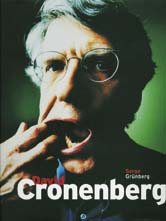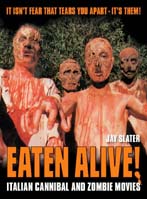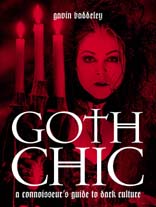Plexus Publishing are a new addition to the genre publishing scene with some intersteing titles available including :
DAVID CRONENBERG: Interviews With Serge Grunberg *NEW*
Emerging from the Canadian cinematic underground like one of his vengeful cerebral mutations, fiercely independent 'auteur' David Cronenberg continues to make films that interest him when the majority of both the independent and mainstream industry pander to the sniveling of unadventurous critics, the imaginative banality of studios, and the hypocritical dictates of conservative special interest groups. Asking no friends, taking no enemies, his work is as disturbing in execution and its subversive style as it is unapologetically honest in its content. Marrying paradoxical systems of belief with enthusiasm and poetic flair, Cronenberg'c cinema is a secret geography of nightmare. Controversial and intellectually daring, he has long been recognized as an original thinker, defying cinematic convention and the crass dictates of mass-majority of morality. Staring unblinkingly at aspects of our condition that other filmmakers strive to avoid, his fascination with the flesh and mind has resulted in a body of work that is consistently philosophical, horrific, and as emotionally charged as it is graphically depicted.
From physical manifestations of our rage made flesh to appendages that demand a life of their own, the flesh is Cronenberg's canvas of choice. Upon its palate he has analyzed our species' primal fear and fascination with flesh -- its abuses, secrets, sexual pleasures, and power to transform or destroy -- as well as the more disturbing penchant it has for developing its own agendas, enslaving the frail organism of our consciousness to its subversive demands from birth. Staring too long, too deeply into our animalistic nature, evoking archetypal fears from the dark wellsprings of Jungian anxiety, he combines symbols of subconscious dread and desire with distinctly contemporary fetishes, finding new forms for the things that repel (and fascinate) us. In addition, and to the consternation of his critics, he goes beyond his preferred text of the human skin to finger the uncertainties of the psyche.
At his best, Cronenberg questions our pre-conceived values and ideals, our interpretations of the universe, and Self. More importantly, in such films as Rabid, Videodrome, Dead Ringers, and Naked Lunch he creates physical, emotional, and philosophical borderlands between the paradoxically opposing -- yet intimately related -- arenas of the flesh, mind, and the technological advancements threatening to encompass them both. Neither traditional horror or science fiction, psychological tragedy or nihilistic post-modern philosophy, Cronenberug's work filters the conventions/expectations of each through his Faustian perspective. He is, in fact, his own genre, his own art form, and we can do far worse than allow our minds to grow by embracing his pessimistic yet morbidly beautiful films -- movies that examine neither the naturalistic world of man or the fantastical world of the mythic, but the shadowy dimensions between such simplistic descriptive terms . . . The surrealistic arenas that Cronenberg makes his own.
Challenging the nature of reality, logical dictates, or absolutes, Cronenberg's greatest work attacks the dependability of perception -- the very way by which we define the world around us and our inner natures. The emotional and philosophical reasons for this, as well as his obsession with the human body, the mind, and amorality are discussed in the thoughtful, fascinating exchanges between Cronenberg and his interviewer. David Cronenberg, by Serge Grunberg, is a celebration and critical examination of the man, his works, and the ways in which both intersect. Compelling, surprising, and never boring, Grunberg's interviewing style is fresh and unobtrusive, asking intelligent questions without forcing his subject to any one stance. The flow of these interviews are similar to an intelligent if informal discussion, and thanks to the quality of the writing we're invited to what feels like a quiet, personal 'chat' between two men, privy to the secret desires and fixations of an undeniably original mind.
Grunberg leaves no critical rock unturned, and allows a thorough, unbiased portrait of Cronenberg to emerge. Covering an impressively wide breadth of material, these pieces examine both Cronenberg's personal and professional lives, both of which are lent scathing wit by his humorous attitude. Covering his career from the early if controversial Shivers to the commercial successes of The Fly, we learn about the pivotal inspirations behind his major films, their production, and how they were met by the public and an intellectually lazy critical establishment. More importantly, we learn, in his own words, the personal toll that his choice of themes has taken on his personal life. This book also takes pains to examine his more recent flexography, wherein he explore new arenas of thought with similar stylistic intensity. Cronenberg reveals fascinating insights into his tragic transsexual love story M. Butterfly at the same time that he comments on the absurdity of the human mind. Spanning the entire length of his quest for truth, Grunberg also includes discussions about the director's latest projects Spider and A History Of Violence, both of which explore new internal terrain while preserving his steadfast dedication to the subversive.
As fascinating when speaking of his daily life as when he is when speculating on humankinds future, Cronenberg is a fluent, exciting speaker, giving reader's the impression that he's speaking only to them. This depth of insight is lent power by Grunberg's carefully crafted questions, and the precision of their arrangement. David Cronenberg is an emotional document of the soul, resonating with the same energy and passion that breaths disturbing life into his films. Of particular note are such topics as his aesthetics, the crime of censorship, "the straight jacket" of political correctness, and his views of sexuality. Including a critically intriguing Introduction by Grunberg and a filmography, this insightful combination of biography and criticism, discussion and dissections, is also a visual feast, loaded with rare stills, photos, and storyboards. "Long live the new flesh!"
Review by William P. Simmons
�14.99 UK/$24.95 USA
Italian Cannibal and Zombie Movies
by Jay Slater

Let me start by saying that I absolutely love the whole Italian cannibal/zombie exploitation movie genre. At the tender age of 17 when the UK video nasty scene exploded I had a great bug smorgasbord of unrated uncut gory gems to relish on the shelves of just about every local video rental store. Up till then my sheltered horror life was pretty much restrained to a selection of Universal monsters and Hammer horrors on network TV, but the video boom seemed to open up a whole new world of terror cinema - though this time round it was more graphic and shocking than I could ever have dreamed. So with the arrival of Jay Slater's 'Eaten Alive' I got the chance to reminisce about this grand new age of the horror movie.
At their worst the Italian horror movie (like any other Italian genre flick) is plagiaristic and cheap in its execution but at their best they're shocking, brutal and highly addictive viewing. 'Eaten Alive' succinctly covers allcomers to the genre and both intelligently and entertainingly gives a wide selection of cannibal/zombie movies their 15 minutes of deserved recognition. What you'll soon find with this fine tome is that it's not just all the usual suspects that are covered here (Zombie this and Cannibal that) but some well selected outsiders to the genre (Pasolini's 'Pigsty' or Ferreri's 'Flesh' anyone?) But even with the regulation expected movies this one offers much more than your run of the mill plot synopsis with review format and this is what gives 'Eaten Alive' that extra welcome edge...
Firstly, I better make clear that although Jay Slater contributes the lions share of the work here there is a vast array of respected luminaries also offering up their own unique perspective and commentaries on this blood soaked genre - Nick Alexander, Ramsey Campbell, Nacho Cerda, Lloyd Kaufman, Joel M. Reed, Brian Yuzna, Jim Van Bebber, Giovanni Radice and on and on, the contributors list really does read like a who's who of the horror genre and their offerings add massively to your reading pleasure. This shows well as they each have their own distinctive way of voicing their passionate love or loathing for the genre (Radice hilariously starts his review of 'Last Cannibal World' with "My god - what a piece of shit!")
But don't go thinking this is just a mass of reviews as many of the movies are also supported by some fascinating (and very much fun) interview segments with Jorge Grau, Ian McCulloch, Robert Kerman, Giovanni Radice, Catriona MacColl, Claudio Fragasso, Beatrice Ring and Ernesto Gastaldi all chatting candidly about their involvement in this very much loved genre.
Now we all know that a good horror book isn't complete without some nice gory images to accompany its written word and 'Eaten Alive' offers a fantastic selection of movie stills and publicity materials from all over the world and while sadly mostly in black and white (with an all too brief colour segment) the selection included is very impressive and makes a great addition to an already excellent volume.
Simply said, if you have a passing interest in the Italian zombie/cannibal scene then you must pick up this lovely book. Sure you know most of the movies already but you'll have great fun discovering them again through some of the genre leading lights eyes. Essential splatter fan reading and one that you'll keep picking up again and again. Buy it now!
�14.99 UK - $19.95 US
by Gavin Baddeley

First things first, I have to confess in my younger days when the 'goth' scene first erupted I happily rode the wave. As a young punk the goth scene of the bands arising from London's Batcave club was an inspiration to folk looking for something with a horror edge. Personally I embraced the scene though never was a good stereotypical goth (well I smiled too much!) but as the years passed like most I moved on to other things (and endearing myself strictly to the horror movie scene).
So it was with bemused interest that I delved into Gavin Baddely's new history spanning tome 'Goth Chic'. Now I have to admit that when I started to read my through this one I was initially cringing at what seemed to live up to the hilarious ideal that 'goth' as a genre was a sombre and serious subject matter for a (ahem) goth 'historian' to morosely delight about. Let's take for example the opening section of the foreword where it is referred to as a philosophical perspective..."Innocence and virtue are treasured only as virgin parchment, upon which the sigils of sin can be written in broad strokes of blood red and midnight black". Good grief, the pangs of what came from a down to earth realistic extension from punk warped into a nightmare of the pretentious 'I'm a vampire' brigade. This theme of seeking a sense for being and needing some sort of historical legacy stretches throughout the first couple of chapters and although alarm bells are ringing you'll be more than thankful to know that once this nonsense is out the way we're delivered a fascinating tome that should delight even those with a passing interest.
'Goth Chic' (for me) kicks off proper in great style with the early days of horror cinema, covering lots of interesting info on films like 'Cabinet of Dr Caligari', 'London After Midnight' and the Universal monster greats - a perfect introduction to the old classics for those new to the horror film scene. Then there's a comprehensive look at horror literature through the years followed by a look at the genre as represented on television and radio (I've always time for coverage on Vampira and The Munsters!) But perhaps most accessible for SGM readers will be the section on the modern horror movie, which has some great reading on screen greats like Vincent Price, Christopher Lee and Ingrid Pitt (well you knew she would be making an appearance at some point eh?) Also covered is the horror comic scene which embraces everything from the yet to be surpassed delights of the EC line to modern (and vastly over rated) graphic novels (Sandman et al)
One of the highlights of 'Goth Chic' has to be the star of the show...the Goth music scene itself. An insightful history of the birth and rise of the UK goth sub-culture. Rightfully folk like Alice Cooper and David Bowie are in there as a taste of what was to come, through to the highly influential Banshees, Cramps and Misfits from the punk days to delightful gems as Alien Sex Fiend and Sex Gang Children (sex seems to have been a theme!) to goth stalwarts Bauhaus, Sisters of Mercy and Joy Division (?!) I have to confess that I absolutely delighted in this section, it read like a chunk of my own memory had been lifted and placed into a book. Bands long forgotten, happy memories of a scene that has long died. Author Baddely has captured the essence of that time perfectly.
Following this though is coverage of what I see as the descent of a once vibrant and refreshing scene, the onslaught of the vanity vampire. Following a section on gothic style (read 'look at pretty me' - well, gothic supermodels? ha!), there's coverage on the staid consumption of goth by the rubber loving S&M scene and wannabe lesbo vampyres. Fascinating reading but also somewhat depressing for folk that could see the goth scene lose its grip on reality and become an absurd dress up fantasy. On a more uplifting note the book closes things off with a nice chapter on the modern 'goth rock' scene, reaching from Christian Death through Trent Reznor to (well he had to be here) Marilyn Manson (welcomingly many of the new rising stars of the goth rock scene get some page space too).
'Goth Chic' is at all purposes an excellent book. Of course at times it downright irritated me but on the main I found it delightfully engrossing and fun reading (there's some nice quotes from DVD scene faves Marc Morris and Nigel Wingrove on the London goth scene and the book is jam packed with great images). The fact that at times Baddely captured the irksome goth perception to a tea is commendation in itself that this is the perfect summing up the goth culture. Excellent work and highly recommended to fans of both the gothic and horror scene.
�14.99 UK - $19.95 US
To find out more about the Plexus line click here
Back